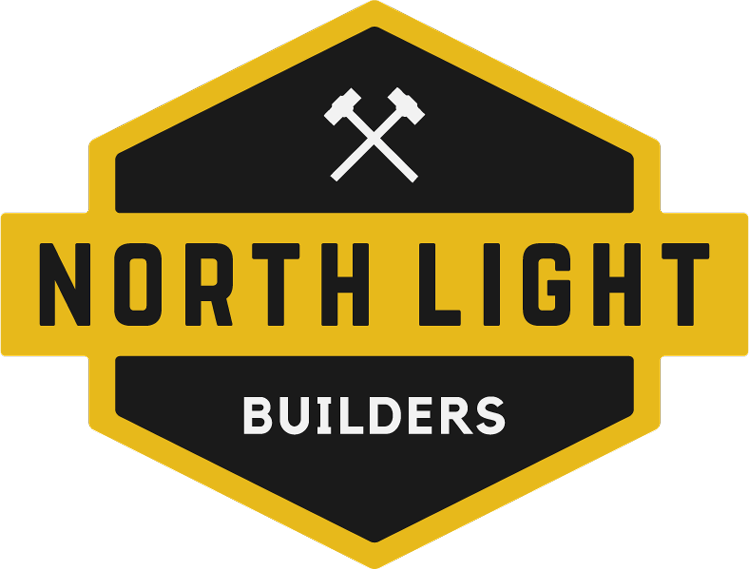North Light Builders have assembled this guide in order to help you find the choose the right contractor for you, best–matched to meet your needs, wants, and expectations. This guide has the potential to do help you select the perfect contractor for your next project.
If you don’t have time to read this page, you can download the PDF below!
- Weed out bad contractors
- Learn the correct way to get 3 quotes
- Learn how to compare contractors
- Get the truth on “Free” estimates
- Identify the 3 types of contractors
- Learn what questions to ask the contractors you interview
- The role that service plays in price and cost
- And MORE!
Many have experienced or heard the horror stories associated with the home remodeling industry. They are rampant. We see reports on the news and know personally those who have experienced nightmare home remodels. These experiences are characterized by poor communication, shoddy workmanship, filthy work conditions, missed project completion dates, and an endless list of broken promises.
Our hope is to provide you with enough information needed in order to make a well-informed and wise buying decision and choose the right contractor. It is the “inside scoop” so to speak.
The Typical Method for Selecting a Contractor
Mr. and Mrs. Smith decide to find a contractor to remodel their home with the hope of getting the kitchen of their dreams. This is a project that has been years in the making and is long overdue. The kitchen is dark and outdated, drawers are broken, there is a lot of wasted space, and it is way too small for entertaining their large family and many friends. Mr. and Mrs. Smith are fed up with their drab non–functional kitchen — it is definitely TIME to remodel!
Like most people, Mr. and Mrs. Smith contact 2–3 contractors and collect “bids” to remodel their kitchen. During each appointment, they may look at some photos of the contractor’s past projects and ask questions like, “How long have you been in business?” or “How soon can you start?” Then they compare the “bids” and make their decision. They might feel like they have done their homework.
After all, the typical homeowner has been advised to “collect two to three free ‘bids’, compare prices, and hire the contractor who isn’t the cheapest or the most expensive.” Seems logical.
Or does it?
What are the risks of an insufficient selection process? If a homeowner does not ask the right questions when interviewing a contractor, the potential for having a bad experience is very likely. The fact is the remodeling industry is an easy–entry industry.
Where Do Homeowners Go Wrong?
What are the risks of an insufficient selection process? If a homeowner does not ask the right questions when interviewing a contractor, the potential for having a bad experience is very likely.
In the remodeling and construction industry, a person can have little to no experience to jump right in. All it takes is a truck and a handful of tools and presto, you’re a general contractor.
Where do homeowners go wrong? Most people believe the advice that you should collect three free estimates or bids. This is an antiquated method for selecting a contractor. We live in a different culture today. People do not have the time to be inconvenienced longer than they should or have to correct work that should have been done right the first time. By using the “three bid” selection process, one typically bases their decision on cost. The results of this can lead to a catastrophe in your home!
The Secret: Bids are NOT Estimates
Most homeowners make their decision based on comparing estimates. It’s not that this is wrong, it’s just extremely hard (if not impossible) to do. The problem with this is that there is no industry standard for estimating a project and all contractors offer different levels of service. There is not one company alike. In addition to this, the typical free “bid” is based on a one to two-hour visit to the home and a ton of incomplete information causing a horribly inaccurate bid. Overall, it is impossible to do a true apple–to–apple comparison.
So why compare estimates at all? How should contractors be compared?
We recommend getting ballpark price ranges or average project costs from a contractor to make sure they fit your desired investment criteria. Then interview the contractor based on their level of service. Your project cost will be different from any other project total because your project is different than any other project. So as long as the contractor is somewhere in your price range, spend time interviewing the contractor himself.
After all, you will be spending the next several weeks and months working with this individual or company. It would be best to make sure that they meet your expectations and that the two of you are able to clearly communicate.
Free Estimates Are Not Really Free
There is a long-standing expectation in this industry that all contractors should give free “bids”. As a result, little work actually goes into the initial estimate. Herein lies the problem.
Some contractors guess an estimate or make a low bid to get their foot in the door. As a result, the homeowner chooses the low estimate because he or she trusts that the contractor actually put a lot of time and energy into quoting their project. But is the estimate really free? Seriously, who works for free? How many people do you know of who are willing to produce quality products for no cost?
The fact is people don’t work for free, especially business owners. If they do, they typically aren’t in business for long. Someone will eventually pay for that free estimate in one way or another.
Whether it is the one out of ten homeowners that accept an estimate and start a project or the contractor who goes out of business because he didn’t charge for his time. Someone ends up paying for the free cost. In most cases, it is built into the selling price of the project.
“Free” Estimates for Many are Paid for by Few
Worst–case, and the most common scenario, is that the price we pay for a “free” estimate is a poorly planned, inaccurately priced, mess of a project which results in disappointment and sometimes the homeowner having to hire a second contractor to correct what should have been done right the first time.
So, when examined more closely, collecting the “free” estimate is not the best approach to hiring your contractor. We feel that most contractors have good hearts and actually care about people and their products. But again, it is very easy to start a remodeling business and there are not many standards set in our industry on how to run a remodeling business. So each contractor does it his or her own way.
We know this from experience. Many skilled craftsmen enjoy working with their hands and get to the point where they decide to start their own practice out of their love for the trade. After ten years their practice has evolved into a business and they find themselves stuck in a business position without business knowledge or experience. As a result, business errors are made, corners are cut, and they have few or no systems and processes. Sadly, many home remodeling companies fit this profile.
Get It Priced Right
The biggest cause of failure is incorrectly priced projects. Whether due to a lack of experience or an effort to attract more business, incorrect low–ball pricing will drive a remodeling company out of business quicker than anything.
For a homeowner, when a quality or warranty issue arises, there is now no one to whom they can turn. The homeowner must then pay a new contractor to come in and fix what they have already paid for. No one wins in this situation.
We’ve Broken These Companies Down Into 3 Types:
Big Hearts
- May absorb the cost of “gray areas”
- Do not charge enough for overhead costs
- Unforeseen costs are probably not invoiced
- Most likely does wonderful work, but often over-commits
Bad Reputations
- Prices projects low to get the sale, knowing the price will change later
- Spends little time on estimates
- Tally up change orders as the project is underway
- Has the reputation of saying one price, but in the end, always charges more
Vanishing Act
- The worst type of the three
- Doesn’t charge enough to realistically get the job done
- Cuts corners, often performing illegal work
- Vanishes with deposit
Ask the Right Questions Upfront
It is crucial that the contractor is reputable and can prove to you that he will honor the promises he is making to you upfront.
Your 3 Most Important Criteria
- Will they do the job I want them to do?
- Will they do the job at a fair price?
- Will they do the job in a timely manner?
Ask: Does the Contractor…
Offer at minimum a 1 year written warranty?
Have a guaranteed price using a fixed–amount contract? Is this a 1-2 page agreement or a thoroughly detailed contract covering what is included, and more importantly, what is NOT included in the project?
Take time to listen to your complete vision for your project before talking about cost?
Provide an upfront production schedule at contract signing so that you know what will happen during each phase throughout the duration of your project?
Have written agreements with employees and trade contractors to ensure performance?
Institute a Pre–Contract Meeting for each project to ensure that every one that is involved in the production phase of the project is familiar with the details, consequently eliminating “surprises” and possible change orders?
Have a list of outstanding references that you may contact on your own?
Acquire permits and use licensed trade and mechanical contractors (e.g. plumber, electrician)?
Have a system for performing RRP Lead renovation and/or asbestos abatement required by the South West Clean Air Agency?
Practice clear communication in a timely manner consistent with today’s technology?
Have a license and bond as required in your state?
Have written testimonials from past clients?
Show clear and well–done photos of past projects?
Possess at least 1 million dollars in liability insurance coverage and require that all trade contractors possess the same, in addition to their own workman’s compensation?
Have a clean reputation on the internet? (i.e. Google the company name)
Offer design ideas and assistance?
Have detailed systems/processes to carry you through the sales–to–design–to–production phases of a project?
Know how long the project will take to complete, and also how long the design and planning phases will take?
Give you a bid that is extremely low? Why? Seem trustworthy and reliable? Does he or she put you at ease?
Communicate well with you, including listening?
Have a plan for how he or she will respect your home and your family?
Trust Your Instincts
Most importantly, you have to feel that the contractor is right for you. You have to determine if the contractor will meet your expectations. If you get a bad feeling, invest the time needed to make sure to choose the right contractor for you. The difference in price between different contractors equals the value you receive or the experience that you will have. Why is there such a difference in price between the contractors you are interviewing? Contractors all pay about the same labor rates, get materials from basically the same handful of suppliers and pay the same fees for specialty trades.
So what is the difference in cost? We believe it is the value you are going to receive when you hire that company.
Contractor A
One–man operation with little or no insurance, works for wages, never mentions a warranty, hand draws a kitchen design on a napkin, pays his helpers cash under–the–table, uses the cheapest trade contractors out there, and has a one page agreement. His price for Mr. and Mrs. Smith’s kitchen is 40% less than Company B.
Contractor B
Heavily insured, charges the right amount to ensure that they are in business 10 years from now should warranty issues arise, offers a written 3 year warranty, uses 3-D computer design software, pays their employees better than most… with great benefits, uses top–rung trade contractors who also warranty their work, and has a clear and thorough contract.
Which company offers the best value?
As a buyer you have many needs, wants, and expectations. In the same way, each contractor offers their own way of completing a project and meeting their clients needs. It is very important to find the perfect fit for you. We hope that this guide enables you to choose the right contractor and begin a lifelong relationship with that company as you transform your home.



